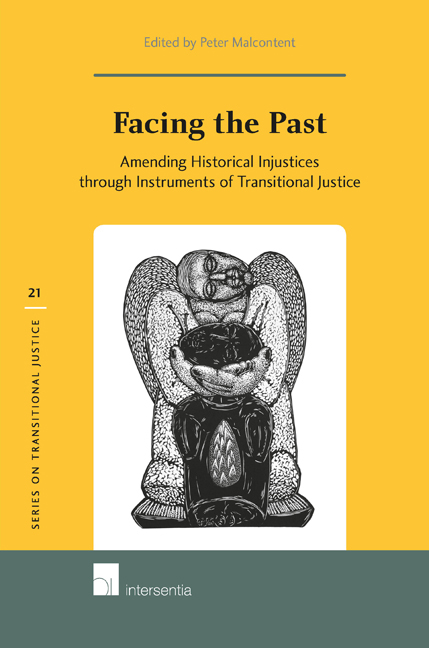Book contents
- Frontmatter
- Acknowledgements
- Contents
- PART I TRANSITIONAL JUSTICE. WHAT'S IN THE NAME?
- PART II RETRIBUTIVE JUSTICE
- PART III RESTORATIVE JUSTICE
- Introduction
- The Whole Truth and Nothing but the Truth? On the Role of Truth Commissions in Facing the Past
- Official Apologies
- Financial Compensation as a Political Process
- Education in the Shadow of History. Education, History Education, and Their Place in Historical Justice
- Governing through Repair. Historical Injustices and Indigenous Peoples in Canada
- PART IV PENDING CASES
- Author Information
Official Apologies
from PART III - RESTORATIVE JUSTICE
Published online by Cambridge University Press: 15 December 2017
- Frontmatter
- Acknowledgements
- Contents
- PART I TRANSITIONAL JUSTICE. WHAT'S IN THE NAME?
- PART II RETRIBUTIVE JUSTICE
- PART III RESTORATIVE JUSTICE
- Introduction
- The Whole Truth and Nothing but the Truth? On the Role of Truth Commissions in Facing the Past
- Official Apologies
- Financial Compensation as a Political Process
- Education in the Shadow of History. Education, History Education, and Their Place in Historical Justice
- Governing through Repair. Historical Injustices and Indigenous Peoples in Canada
- PART IV PENDING CASES
- Author Information
Summary
INTRODUCTION
The Man in the White Sharkskin Suit is an autobiographical story of the expulsion of Arab Jews from Egypt after the 1956 Suez War. After the book was published the author, Lucette Lagnado, received a letter from a retired Egyptian diplomat who wrote: ‘almost no one wants to admit the horrible (…) even criminal way Egyptian Jews have been treated’. As Lagnado commented: ‘I realized that after forty years, my family – and tens of thousands of others – had finally obtained (…) what they had most wanted, other than the ability to return: an apology – an acknowledgment of our pain’.
According to a United Nations General Assembly resolution, ‘victims of gross violations of international human rights law and serious violations of international humanitarian law’ have the right to a remedy. Remedies include inter alia ‘Public apology, including acknowledgement of the facts and acceptance of responsibility’, ‘Verification of the facts and full and public disclosure of the truth’, and ‘guarantees of non-repetition’; all aspects of a complete and satisfactory apology. Victims are defined as ‘persons who individually or collectively suffered harm’ as well as ‘the immediate family or dependants of the direct victim’. Thus, evolving international law requires apologies to victims and their direct family members for gross violations of their human rights. This resolution, however, does not call for retrospective apologies for events that have no surviving victims or family members or dependants. Nevertheless, since the 1980s official apologies have proliferated.
I define an official apology as an apology by a corporate entity with standing to represent a group of some kind. The corporate entity is often a state, but could also be a business or a private group such as a religious community. The corporate entity issues the apology in the name of the group it represents, such as the citizenry of a country, the officers and shareholders of a corporation, or the members of a religious community. The individual who delivers the actual apology has standing to do so because she officially represents the corporate entity, regardless of whether the incident or words for which she is apologising occurred during her tenure in office.
- Type
- Chapter
- Information
- Facing the PastAmending Historical Injustices Through Instruments of Transitional Justice, pp. 247 - 264Publisher: IntersentiaPrint publication year: 2016



